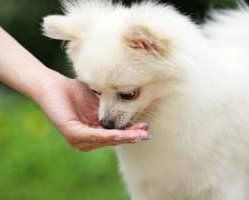Diarrhea
PetPom

The
Pomeranian
Information
Center
Pomeranian Diarrhea
Overview
Out of all of the types of stomach and intestinal issues that can occur with a puppy or dog, when a Pomeranian develops diarrhea, this can be troubling to say the least.
This small toy breed dog is vulnerable to the quick dehydration that often occurs with this ailment, not to mention discomfort, weakness, and other elements.
Owners would be wise to familiarize themselves with how to treat for this, since it can drain a Pom of his energy and in worst case scenarios, can be quite dangerous.
Since this can strike very quickly and catch owners off guard (certainly no one plans on this happening!), we do suggest that all Pom owners read though this, to be better prepared. Statistically, dogs experience at least 3 bouts of this type of intestinal distress in a lifetime.
This section is going to cover all of the details of:
- What - exactly - constitutes diarrhea (versus simple wet bowel movements, etc.)
- Why a Pomeranian puppy or dog may develop a case of diarrhea
- When this is accompanied by blood or mucus
- When this is accompanied with vomiting and other physical aliments
- Steps that you can take to treat your Pomeranian at home
- Items to have at home to prepare for this issue
- Red flag warnings that a Pomeranian with diarrhea should be taken to the veterinarian for medical intervention
The Difference Between Diarrhea and a Wet Bowel Movement
When a Pomeranian is
constipated or dehydrated, bowel movements may be dry. However, loose stools are not normal either. So, what is normal and how can you tell if there is a problem?
1-
First, it is highly recommended to take a peek at what your Pom leaves behind after going to the bathroom.
Some owners do this if they are using poop bags when walking at the park or in the neighborhood, but when a Pom is using his designated bathroom area in the yard, this may not be done.
Therefore, it is a good idea to have a quick look - You will be able to know if the consistency is normal and additionally be able to spot worms, as some types will be visible in the feces.
2-
The definition of diarrhea is frequent or loose bowel movements. In this regard, the term loose can range from very wet stools that do not hold as shape to liquid diarrhea. When a Pomeranian has healthy bowel movements, they will occur 2 to 3 times per day. The consistency should be firm yet pliable; best described as dough like. If you were to pick it up, it would stay in one piece, but you would be able to squish it.
3-
When a Pomeranian puppy or older dog has diarrhea, he may have frequent bowel movements, meaning 4, 5 or more per day. The other element will be that the feces will be too wet to theoretically pick up and have it hold its shape.
And of course, in severe cases, it will be a brown liquid with or without food particles. It is not uncommon for diarrhea to contain mucus; the mucus will often be substance normally found in the intestines to keep the colon lubricated, however it can be expelled with fecal matter quickly moves through the dog's body.
Causes of Diarrhea with the Pomeranian Breed
There are actually quite a few causes, so first let's look at the most common:
The 5 Most Common Reasons
1. Food intolerance
2. Ingestion of non-food substance, spoiled food or feces (his own or another dogs - *
See also - Pom eats poop)
3. Ingestion of spoiled or bacteria laden food
4. Viral or bacterial intestinal infection
5. Internal parasites including roundworms, giardia and coccidia
Other Possible Reasons Include:
A quick change in diet, kidney disease, liver disease, bowel disease, cancer, colitis, stress induced diarrhea, allergic reaction to food or medication, hemorrhagic gastroenteritis
Other Signs and Symptoms
A Pomeranian with diarrhea may also have:
• Gas
• Weakness
• Fever
• Vomiting
• Decreased appetite
Treating Diarrhea, First Assess Your Pom
Take an assessment of your
Pom's health. You will look for:
Blood in the stools-
Fresh, red blood may be due to rips in the anal tissue if a puppy or dog has been having many bouts of expulsion, however it can also be a sign of worms, hemorrhagic gastroenteritis and particularly for puppies under the age of 1 year it may be a sign of Parvo (parvovirus).
All of these possible causes are very serious and require medical treatment (more on this ahead)
Your Pom's temperature-
The normal body temperature of a dog is between 101 and 102.5 F (38°C to 39.2°C). To know if your Pomeranian has a fever, you will need to take his temperature rectally using a canine rectal thermometer.
Swipe it with rubbing alcohol (both before and after use), dab it with petroleum jelly, with your Pom lying down gently move his tail to the side and gently insert it approximately 1 inch (2.5 cm).
Note:
If you suspect that your Pomeranian has Parvo, the thermometer should be cleaned with bleach, as rubbing alcohol does NOT kill the virus. (Or better yet, discard and replace it with a new one).
Signs of dangerous dehydration or electrolyte imbalance-
Severe weakness, signs of dizziness, pale lips and/or gums, blue lips and/or gums, refusal or inability to drink water and/or vomiting are all signs that a Pomeranian is becoming or has already developed dehydration and/or an electrolyte imbalance which can be very dangerous for this toy breed.
Vomiting -
Diarrhea and vomiting together is a dangerous combination for any dog, but especially for a small toy breed such as the Pomeranian. In and of itself, this often causes rapid fluid loss and imbalances that can be fatal if not professionally treated.
In addition, a combination of vomiting and diarrhea may be caused by ingestion of a poison, a severe allergic reaction or severe stage of worm infestation.
Also, hemorrhagic gastroenteritis (HGE) a very serious and sometimes fatal disease has 2 main symptoms: Diarrhea and vomiting. This must be treated with IV fluids and antibiotics - 90% of dogs properly treated by a veterinarian will survive this.
Treatment After Assessment
If you have assessed your Pom, and he does not have bloody diarrhea, vomiting and/or a fever and shows no other troubling signs other than the diarrhea itself, you can often treat this at home for 1 to 2 days to see if it clears up before taking him to the vet.
Please note that each puppy and dog is different and 'red flag's signs will vary and the above is not a complete list. If you are on the fence, it is best to play it safe and make an appointment.
1-
Monitor your Pomeranian, since additional symptoms may manifest quickly. Also, a mild case of diarrhea can swiftly turn into a severe case.
Therefore, keep a close eye on your Pom. During this time, your puppy or dog should NOT be left home alone.
Whether this means that someone in the household will need to take a personal day from work, a friend or family member will come to stay with your Pom or other arrangements are made - it is important that a responsible person be present to take care of a Pom until the diarrhea clears up or he is brought to the veterinarian for treatment.
2-
A Pom's bum may become very sore very quickly. When a dog has diarrhea, digestive enzymes are being expelled with the stools, which can burn the sensitive skin of the anus. The skin may then become inflamed, red and very sore (See also: Pomeranian skin problems).
It will be important to keep the area clean and dry. After each expulsion of fecal matter, gently clean the anus with gentle canine body wipes or tushie wipes like Petkin Tushie Wipes for Dogs . This is the only type of wipe that should be used; even soft washcloths with soap or shampoo can hurt during this time.
. This is the only type of wipe that should be used; even soft washcloths with soap or shampoo can hurt during this time.
Once the diarrhea has cleared up, you can dab the area with aloe vera. If you see cracks in the skin, apply spread a thin swipe of antibacterial gel (such as Neosporin) which will work to fight against possible skin infection.
3-
You will want to confine your Pom to one area during this time WITHOUT isolating him, since it will be important to keep a close eye on your puppy or dog. You'll find that most Poms simply want to rest, as diarrhea can zap the energy of the most active dog.
Placing your Pom in his designated gated area or indoor playpen
can work well if you lay down pee pads, layered to create a barrier on top of the floor.
Another option, if your Pom wants to remain close to you and cuddle on the sofa, is to use a doggie diaper and take your puppy or dog outside every 30 minutes or so. You may want to forgo normal house training at this time and simply carry your Pomeranian to the bathroom area since you will want him to conserve his energy.
4-
Stop feeding your Pom his regular food during this time.
It is normal for puppies and dogs to have a decreased appetite when suffering though a bout of diarrhea and it is best refrain from giving any food for about 8 to 10 hours, which allows the intestines to rest.
After this time, you will want to begin feeding a very bland diet. Plain white rice mixed with boiled, white breast chicken meat is easy on the digestive system. This should be fed for 1 to 2 days.
If things clear up during the first 2 days, slowly ease back into regular meals.
If you suspect that a food intolerance has caused this (your Pom has had frequent diarrhea not due to other issues or if you have just changed brands when the problem began), you may wish to reevaluate what brand you are feeding your Pomeranian.
After this time, you will want to begin feeding a very bland diet. Plain white rice mixed with boiled, white breast chicken meat is easy on the digestive system. This should be fed for 1 to 2 days.
If things clear up during the first 2 days, slowly ease back into regular meals.
If you suspect that a food intolerance has caused this (your Pom has had frequent diarrhea not due to other issues or if you have just changed brands when the problem began), you may wish to reevaluate what brand you are feeding your Pomeranian.

5-
Keeping your Pom hydrated is very important.
Cool, fresh water should be available at all times and a Pom should be encouraged to drink. In addition to this, it is recommended to offer an electrolyte solution. Pedialyte is a popular brand that is easy to find OTC and most Poms like the flavor. It is best to dilute this: 50/50 solution to water.
6-
If your Pomeranian's diarrhea is increasing in severity, your Pom develops any secondary issues or if it does not clear up after 48 hours, it will be time to bring him to the veterinarian. The vet may ask for a stool sample which can be placed in a small zipped plastic bag. You may want to place a doggie diaper on your Pom for the ride there.
At the office, the following should be done:
• A full physical
• Examination of stool sample
• Blood tests
The vet may also decide to:
• Perform an ultrasound
• Take a culture
• Perform an endoscopy (a thin, flexible tool with a light and camera attached, is inserted to examine the digestive tract
Treatment varies depending of the cause of the diarrhea. Pomeranians that have become severely dehydrated may be given intravenous fluid to balance out fluids.
Since the cause of the diarrhea can range from worms to bacterial infection to parvo, treatment will range from de-wormer to antibiotics and more.
If you email photos to us, you agree that PetPom is given free copyright to use at our discretion. We will always credit the photo to the name of the Pom's owner(s) if it is supplied.
Email: Contact@PetPom.com
All text, images and artwork protected by US and International copyright laws. All rights reserved. Copyright PetPom.com
We are a participant in the Amazon Services LLC Associates Program, an affiliate advertising program designed to provide a means for us to earn fees by linking to Amazon.com and affiliated sites.



